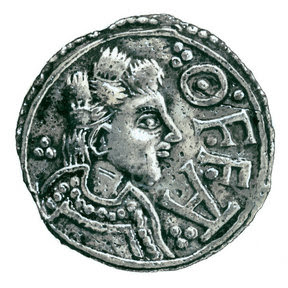 |
| Fotheringhay Church |
I've been interested in Richard III ever since I discovered his birthplace during a cruise on the River Nene. I also share his birthday, which has kept that interest alive for over 20 years.
 |
| Henry I Memorial Cross |
When the news broke about the finding of Richard's remains, I thought of another monarch, whose burial place MWNN and I had discovered during a different cruise, this time on the River Thames.
For some reason, lost in the distant memory of the past, we visited Forbury Gardens, in Reading, by road, shortly after an aborted trip up the River Kennet earlier in the summer.
There we found a charming urban park that contains the remains of Reading Abbey. Henry I (son of William the Conquerer) founded the Abbey in 1121, and was reputed to have been buried there.
When we visited, there was a small car park and access to the gardens on foot. The park has been re-furbished since then, and the notice of Henry's burial removed from interior railings.
A plaque on the Abbey ruins, unveiled on the 800th anniversary of the founding of the Abbey, marks Henry's burial.
Henry isn't the only 'missing' monarch. There are many others whose burial spot has been lost for one reason or another. Is it a mark of the renewed popularity of the present Royal family, the remarkable story of the re-internment of Richard III's bones, and an increase of interest in tracing one's own ancestors, that has led to the search for the remains of Henry Beauclerc?
Unearthing Henry may prove more difficult than finding Richard III. It's possible that the remains are underneath a nursery school or Reading Prison.
 |
| Coin found at Foxholes on the road from Hitchin to Offley |
Even more difficult, could be the search for King Offa of Mercia's burial site. He died at Offley, near Hitchin, so it is possible that he was buried in the church he founded beside the river Hiz.
However, legend has it that his body was transported to Bedford, on the River Great Ouse, and buried there. Given the river's habit of flooding, the remains of the first King if the English could be in the mud at the bottom of the river. If King Offa’s grave is located in the River Great Ouse itself, as suggested, this would involve an aqua-archaeological survey, presumably involving personnel in full scuba gear.

